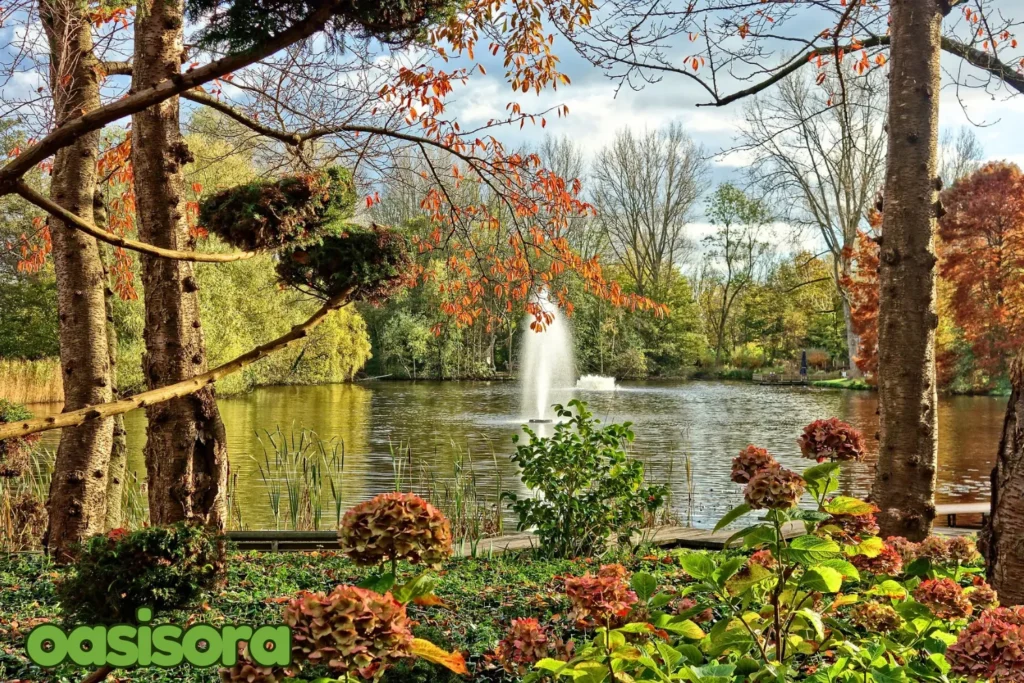
Imagine gentle water sounds and peaceful surroundings with a Japanese Zen garden fountain. These beautiful spaces combine nature and calm design. Plus, the Water features are at the heart, creating serenity. The peaceful ponds, streams, and bamboo water basins make Japanese gardens more calming and serene. Also, according to studies, they bring calmness to your mind, harmony to your space, and balance to your life.
In this post, we will discover 4 amazing Japanese water features that bring peace and beauty to your space, indoors or out. With these inspiring ideas, you can create your own Zen oasis.
TL; DR
- Japanese gardens feature three main water elements: rock fountains, bamboo fountains, and serene ponds.
- Customize your garden fountain with Japanese-inspired designs.
- Japanese gardens also feature serene streams, stunning waterfalls, and elegant water basins.
What are the 4 Zen Garden Fountain Ideas for Your Backyard?
Update your backyard with these three Japanese-inspired Zen fountain ideas, combining peacefulness with contemporary design:
1. Rock Fountain
In Japanese, ‘Ishi-dōrō’ or rock fountains are the key elements in Japanese garden’s aesthetic and philosophical facets. Made from natural stone, they add beauty and meaning.
Plus, these fountains symbolize harmony and balance, and each element has a specific purpose.
Rock fountains represent water, even when it’s not there or exemplified symbolically rather than physically.
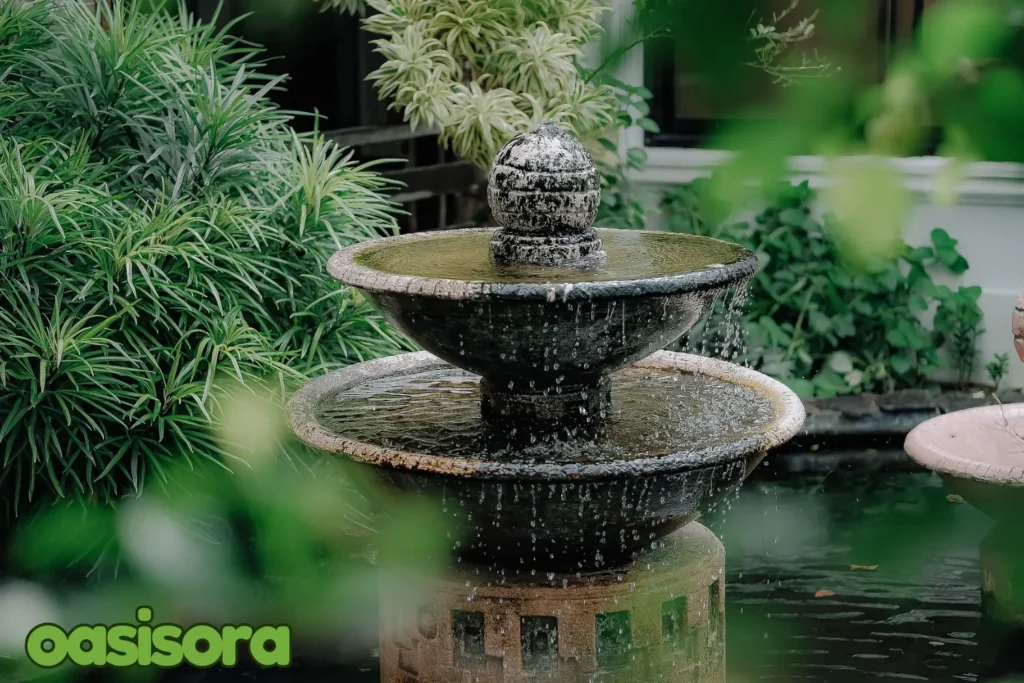
Rock Fountain
Moreover, the rocks can symbolize mountains or islands, helping create a tiny version of nature. This is what Japanese gardens strive for a small, peaceful space that reflects the natural world.
Also, the Zen garden fountains create a beautiful focal point in the garden, catching the eye and perfecting the surrounding natural elements.
The gentle sound of dripping or flowing water complements nature, bringing tranquility and peace.
Furthermore, the rock fountains blend seamlessly into Japanese gardens, looking completely natural. Every detail is thoughtfully planned:
- Rock placement ideas
- Water flow
- Surrounding plants
This careful design creates a peaceful, harmonious scene.
In Japanese culture, water symbolizes purification. Rock fountains in gardens represent cleansing and renewal.
Visitors often use the water to purify their hands and cleanse their mouths before tea ceremonies. This ritual connects them with nature.
Moreover, in Japanese tea gardens, rock fountains welcome guests on the path to the tea house. They offer a place for purification and create a tranquil atmosphere, preparing visitors for the intimate tea ceremony.
A rock fountain’s gentle sound creates a calm atmosphere. Ideal for meditation and quiet thoughts. This fits the garden’s goal: a peaceful spot for thinking and renewal.
Plus, the soothing water helps you unwind, relax, and reconnect with nature.
In addition, the rock fountains in Japanese gardens showcase the seasonal changes. Water flow changes or freezes in winter, mirroring nature’s cycles and rhythms.
Ultimately, the Zen garden fountains in Japanese gardens showcase the careful planning and deep meaning that defines these serene spaces.
2. Bamboo Fountain
These fountains are called shishi-odoshi, often called “deer chaser” or “deer scarer.” They were originally designed and made to keep animals away from eating garden plants.
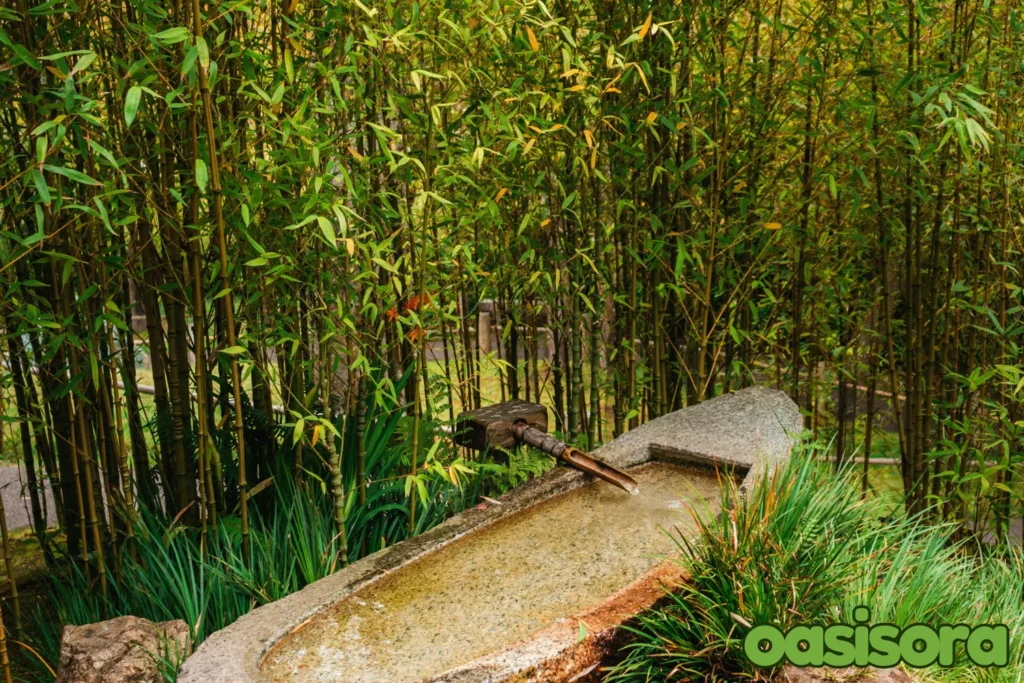
Bamboo Fountain
Over time, their purpose shifted from practical to aesthetic, enhancing the garden’s serenity. Today, they are valued for:
- Their soothing, rhythmic sounds
- The peaceful atmosphere they create.
The bamboo hitting the rock creates a sound that originally scared away deer and other types of animals.
However, this sound is now valued in modern gardens for its peacefulness and soothing rhythm.
The shishi-odoshi has deep meaning beyond its practical use. Water flowing and emptying represents impermanence and life’s flow.
Moreover, this rhythm reflects life’s cycles and the law of cause and effect.
shishi-odoshi is excellently integrated into Japanese gardens. They are carefully placed among ponds or streams to enhance the water features and near the stones and plants creating a serene and natural atmosphere.
Although Shishi-odoshi is often featured in various Japanese gardens Zen gardens, they are often associated with Zen gardens where they add to the peaceful atmosphere and symbolic depth, encouraging meditation and contemplation.
Plus, the shishi-odoshi’s unique sound and elegant design have made it an iconic symbol of Japanese culture, featured globally in:
- Films
- Art
- Gardens
Plus, such Zen garden fountains represent Japan’s timeless aesthetic principles.
Today, Shishi-odoshi are admired globally for their blend of purpose, elegance, and peaceful ambiance, gracing traditional Japanese gardens and modern designs alike.
3. Pond
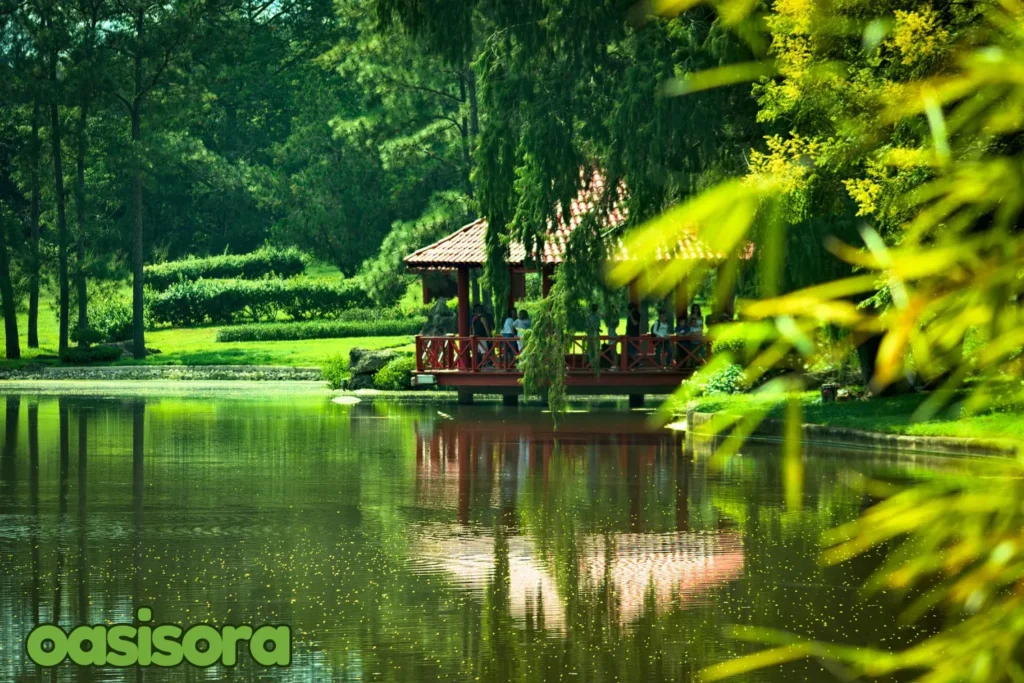
Pond
In Japanese gardens, ponds are more than beautiful water features. They hold deep symbolic meaning and are crucial to the garden’s design and spiritual essence.
Raised ponds can add serenity even in compact Zen gardens, making Japanese garden design accessible in smaller spaces.
Furthermore, in Japanese culture, water symbolizes purity, renewal, and transformation. This garden fountain idea represents the vastness of lakes or oceans, mirroring nature’s serenity and depth. They embody:
- Tranquility
- Depth
- Reflection both literal and metaphorical.
The Japanese gardens replicate nature in a tiny miniature but perfect way. Ponds are key for giving a feeling of space and calm.
Plus. The rocks, islands, and plants are placed carefully around and in the pond to look like natural landscapes, connecting the garden to nature.
Moreover, the ponds in Japanese gardens hold spiritual meaning. They separate the physical and spiritual realms, and water bridges the two, connecting us to the divine.
The pond’s design, shape, and surroundings reflect philosophical principles, inspiring contemplation, peace, and serenity.
In addition, pond water’s reflective surface expands the garden’s visual beauty, mirroring the sky, greenery, and architecture.
This adds depth and tranquility to the space. The soothing sounds of water, gentle ripples, or koi fish movements create a calming acoustic experience.
Like ponds in Japanese gardens, Zen Garden Fountain is home to vibrant koi fish and goldfish, admired for their beauty, longevity, and resilience.
Plus, their graceful movements inject life and color, symbolizing good fortune and prosperity. These beautiful water features naturally attracted birds, insects, wildlife, and native meadow grasses, harmoniously blending the garden with nature.
Japanese garden ponds reflect the season’s transformation, creating a charming display of change throughout the year.
The water’s interaction with shifting vegetation, light, and weather fosters a touching reminder of life’s impermanence and cyclical nature of life.
Strategically placed ponds interact with garden structures, crafting a dynamic interplay between water, architecture, and nature.
This interaction guides visitors along twisty paths, revealing ever-changing views and exceptional experiences.
Lastly, the serene atmosphere of ponds inspires meditation and inner peace. Japanese garden designers carefully craft the pond’s setting to nurture mindfulness, guiding visitors to pause, breathe deeply, and harmonize with nature.
4. Zen Three Bowl Fountain
The Zen Three Bowl Fountain can help you experience serenity. The three bowls gently flow water, creating soothing sounds. This serene fountain brings calmness and peace.
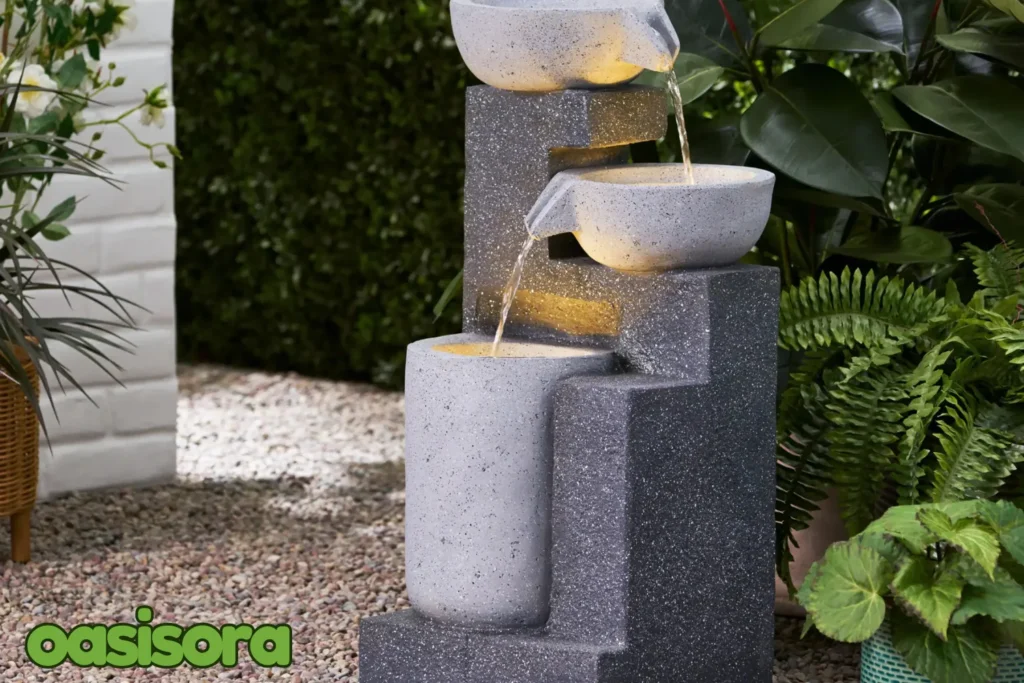
Zen Three Bowl Fountain
Perfect for meditation, it helps reduce stress. Plus, its simple design fits any space. So, enjoy tranquility and harmony with this beautiful water feature, inspiring mindfulness and inner calm.
5. Statue Zen Garden Water Fountain
In Japanese gardens, water fountains are really important features. They do not just offer a beautiful look but are also quite significant and add calm to your garden. Even small spaces can have a statue Zen garden fountain, making your garden calm and beautiful.
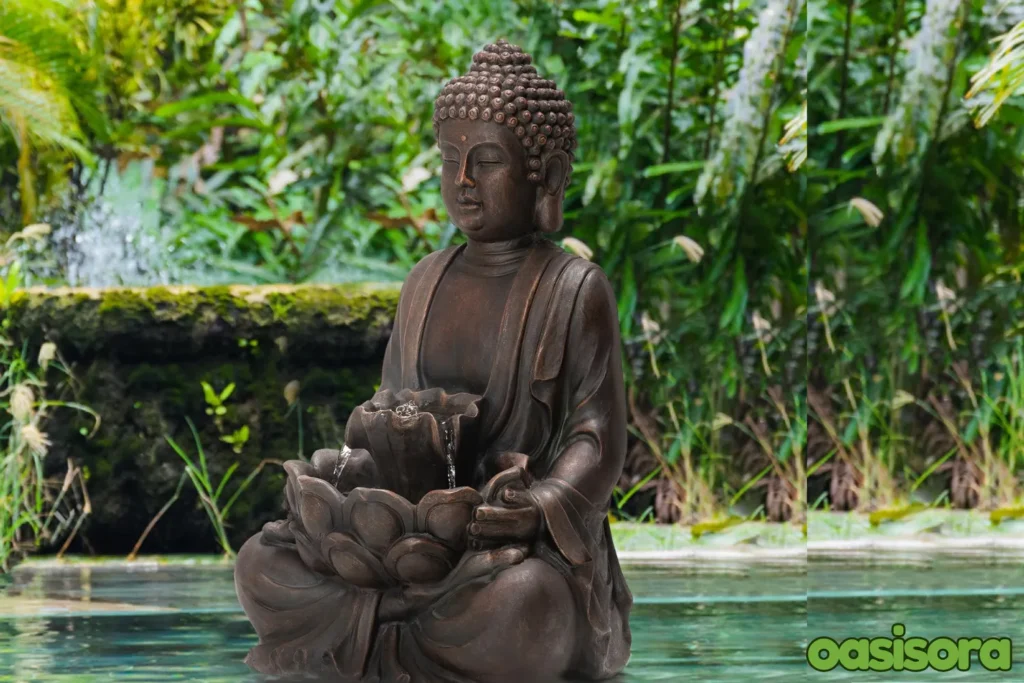
Statue Zen Garden Water Fountain
Plus, in Japanese culture, the gentle flow of water from this kind of statue fountain symbolizes:
- Purity
- Renewal
- Transformation.
This garden fountain brings nature’s calmness to your home. The gentle water sounds make you feel peaceful and quiet. It’s like the fountain is showing you all the beautiful things around you.
Japanese gardens are like small, perfect copies of nature. A statue Zen garden water fountain is a great way to make your garden feel calm and spacious. You can choose a statue to match the garden’s natural beauty, making it look aesthetic and pretty.
The Zen statue yard fountain brings life to your garden and offers many versatile perks. It attracts birds, bugs, and animals. Also, as the seasons change, the fountain changes too, showing you nature’s beauty growing and changing.
Choosing the Right Zen Garden Fountain
Here are some factors that are to be considered while picking a Zen garden fountain for your garden:
1. Size Considerations
Choose a fountain that fits your garden’s size. The small fountains suit cozy spaces, large ones make a statement. Ensure the size you choose blends flawlessly without overwhelming the surrounding elements.
2. Materials
Secondly, choose the most natural materials for your Zen garden fountain. The granite or basalt stones for a natural, long-lasting look, and bamboo for a classic, earthy feel.
Each material adds unique textures and colors, creating a harmonious garden atmosphere.
3. Sound Level
The way water flows through a fountain changes its look and sound. A gentle trickle creates a calming atmosphere, perfect for relaxation. Plus, a robust cascade adds energy.
So, choose a fountain that fits your desired mood: serene and peaceful or lively and uplifting.
4. Lighting Options
With the correct lighting, your fountain will shine. You can choose:
- Warm lights for a calming glow
- Soft lights for highlighting
- Color-changing lights for visual appeal
And solar-powered lights for an environmentally friendly option.
5. Selecting a Suitable Garden Style for Your Zen Fountains
A Zen fountain can look amazing in any garden style and will blend with nature perfectly. But before choosing it, think carefully about your yard’s style. Here are some key things to consider:
Determine Your Garden’s Theme
You can also pick a Zen fountain that will match your yard’s theme. Is it modern, traditional, or has a natural hint? This will help you pick a fountain that blends in very nicely.
Consider Your Garden’s Size
Secondly, you make sure the size of the fountain your garden can hold. A large garden can hold a large fountain, of course, and a small one holds a smaller one. It’s up to your yard what it can hold!
Think About Your Personal Style
Pick a fountain that fits your style. Do you like simple or ornate things? Opt for a fountain that matches your taste and preference.
Assess Your Garden’s Layout
The next stage is to examine your garden’s design for example, mixed, formal, or informal. Ensure the fountain you choose complements the design of your landscape very nicely.
Select a Fountain That Fits in with the Scene
You can pick a fountain that fits the surrounding landscape. Select colors that blend nicely with the setting and natural materials like wood or stone.
6. Mix and Match Elements
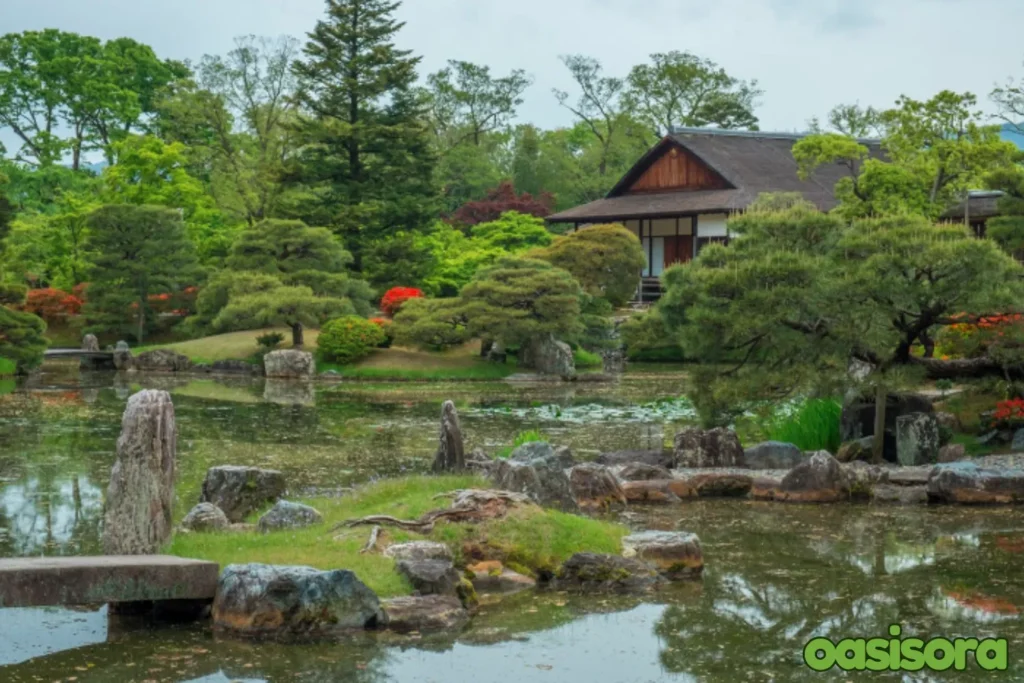
Elements of japanese garden
Folks! Don’t be scared to combine various components to create a distinctive garden design. You can blend ornate and natural components or modern and classic pieces. To create depth and fascination.
Likewise, you can mix and match different forms, colors, and textures. For instance, you can combine wood or natural stone accents with a contemporary Zen garden fountain. It looks remarkable!.
Ultimately, by combining and contrasting components, you can design a unique garden area that expresses your individuality and sense of style. So, try it and enjoy relaxing in your yard!.
Maintenance Tips for Zen Garden Fountain’s Longevity
With regular maintenance and care, you can keep your fountain in the best form. Follow these tips to keep your fountain efficient always:
- Clean debris from the water regularly.
- Check the pump to ensure smooth operation.
- Monitor water levels to prevent overflows.
- Treat water to prevent algae growth.
Final Words
Create your serene landscape with Japanese Zen garden fountains. These beautiful spaces naturally combine nature and calm design, bringing harmony to your life.
Plus, you can choose from three refreshing water features: rock fountains, bamboo fountains, and peaceful ponds.
Additionally, each element symbolizes balance, renewal, and contemplation.
Meanwhile, the gentle sounds and soothing rhythms offer mindfulness and inner calm.
Moreover, consider size, materials, sound, and lighting when selecting the perfect fountain for your space.
Bring tranquility and peace into your life with stunning Japanese garden fountain ideas.
FAQs
1. What does a Zen garden represent?
A Zen garden is a tranquil area that symbolizes balance with the natural world. It represents simplicity, inner peace, and life’s cycle.
2. What does water represent in a Zen garden?
In a Zen garden, water means change, flow, and calmness. It helps us reflect and find inner peace.
3. Why is there no water in the Zen garden?
Water in the Zen garden fountains may be absent to emphasize symbolism, simplicity, and low maintenance.
4. What religion is a Zen garden?
Zen gardens originate from Buddhism.
5. What does a Zen garden called?
Karesansui, or Japanese rock gardens, are other names for the Zen garden.
6. What is a symbol of Zen?
Common symbols of Zen include:
Rocks (Strength)
Water (Change)
Empty Space (Contemplation).
7. What is the philosophy of the Zen garden?
The Zen garden emphasizes harmony, balance, simplicity, and mindfulness.
8. What is the ideology of the Zen garden?
The main ideology behind the Zen garden is that it encourages connection with nature, self-reflection, and inner peace.

3 thoughts on “Zen Garden Fountain: 4 Calming Ideas for Peaceful Spaces”